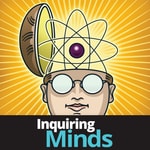Inquiring Minds – Détails, épisodes et analyse
Détails du podcast
Informations techniques et générales issues du flux RSS du podcast.


Classements récents
Dernières positions dans les classements Apple Podcasts et Spotify.
Apple Podcasts
🇩🇪 Allemagne - socialSciences
10/08/2025#36🇺🇸 États-Unis - socialSciences
10/08/2025#66🇨🇦 Canada - socialSciences
09/08/2025#87🇺🇸 États-Unis - socialSciences
09/08/2025#57🇨🇦 Canada - socialSciences
08/08/2025#67🇨🇦 Canada - socialSciences
07/08/2025#55🇺🇸 États-Unis - socialSciences
07/08/2025#74🇨🇦 Canada - socialSciences
06/08/2025#37🇺🇸 États-Unis - socialSciences
06/08/2025#88🇺🇸 États-Unis - socialSciences
04/08/2025#82
Spotify
Aucun classement récent disponible
Liens partagés entre épisodes et podcasts
Liens présents dans les descriptions d'épisodes et autres podcasts les utilisant également.
See all- https://omnystudio.com/policies/listener
521 partages
- https://jordangrumet.com/
51 partages
- https://www.patreon.com/inquiringminds
907 partages
- http://patreon.com/inquiringminds
11 partages
Qualité et score du flux RSS
Évaluation technique de la qualité et de la structure du flux RSS.
See allScore global : 43%
Historique des publications
Répartition mensuelle des publications d'épisodes au fil des années.
The Most Delicious Poison with Noah Whiteman
mercredi 14 août 2024 • Durée 39:04
Indre welcomes evolutionary biologist and UC Berkeley professor, Noah Whiteman unto the Inquiring Minds Show to delve into the world of nature’s toxins and Whiteman’s new book.
"Most Delicious Poison: The Story of Nature's Toxins from Spices to Vices.” explores the adaptations that have enabled various organisms to not only survive but thrive in environments laden with toxic substances, such as the monarch butterfly's resistance to milkweed toxins, and the broader and intricate relationships between plants and animals, focusing on how certain organisms have evolved to resist or utilize toxins for survival.
Their discussion highlights the potential medical benefits of plant-derived compounds, the importance of biodiversity, and how nature’s poisons aren’t all harmful but can be extremely beneficial to human health in the right contexts to be harnessed for therapeutic purposes. This duality underscores the importance of a nuanced understanding of toxins and their roles in nature.
Listen in to get a rich insight into the intersection of science and society, as Whiteman articulates the broader implications of his research, the case studies mentioned in his new book, and an overall appreciation for the deep complexity of nature’s toxins and how they affect life on Earth for all living things.
Links:
Inquiring Minds Homepage: https://inquiring.show/
Support the show: https://www.patreon.com/inquiringminds
See https://omnystudio.com/policies/listener for privacy information
Revealing the Secrets of Supercommunicators with Charles Duhigg
mercredi 7 août 2024 • Durée 44:40
Don’t Panic, but Robert Sapolsky Says There’s No Free Will
mercredi 18 octobre 2023 • Durée 48:00
This week we talk to Robert Sapolsky—MacArthur “Genius” Fellow and professor of biology, neurology, and neurosurgery at Stanford—about his new book Determined: A Science of Life without Free Will.
Up To Date | Mosquitoes, robots, pupils, beavers, and Earth’s crust
mardi 28 juillet 2020 • Durée 26:55
This week: A new study showing how you can, as a way to control their population, change blood-drinking female mosquitoes to male, non-biting mosquitoes by changing just one gene; research into new ways for robots to grab things; a study showing the ways in which the pupils of people who have PTSD react differently than others, even in emotionally-neutral situations; beavers in Alaska are working overtime in the Arctic tundra as a result of climate change and possibly damaging the ecosystem; and research examining how the Earth’s crust cracked in the first place.
A Story about Forests, People, and the Future
jeudi 23 juillet 2020 • Durée 39:05
We talk to science reporter Zach St. George about his new book The Journeys of Trees: A Story about Forests, People, and the Future.
From the slave trade to climate change—why corporations defend the indefensible
jeudi 16 juillet 2020 • Durée 40:01
We talk to environmental attorney Barbara Freese about her new book Industrial-Strength Denial: Eight Stories of Corporations Defending the Indefensible, from the Slave Trade to Climate Change.
The Language of Butterflies
mercredi 8 juillet 2020 • Durée 39:11
We talk to science writer Wendy Williams about her new book The Language of Butterflies: How Thieves, Hoarders, Scientists, and Other Obsessives Unlocked the Secrets of the World's Favorite Insect.
Up To Date | The Drake equation 2.0; Nanotech yeast; Why are plants green?; Wasp boxing
mardi 30 juin 2020 • Durée 21:59
This week: New astrophysics research on the likelihood of there being intelligent life on other planets in our solar system; a study in which atomic force microscopy was used to study the biology of yeast; research into why the chlorophyll in plants doesn’t absorb peak (green) sunlight; and a look at a study that involves watching wasps fight each other in front of a crowd.
Where educators go wrong
mardi 23 juin 2020 • Durée 39:16
We talk to Tony Wagner, a globally recognized expert in education and senior research fellow at the Learning Policy Institute, about his new book Learning by Heart: An Unconventional Education.
The history of structural racism in medicine
mardi 16 juin 2020 • Durée 45:23
We talk to Robert Rosencrans, an MD/PhD student at the The University of Alabama at Birmingham about the history of structural racism in medicine and the problems with race-based medicine.









